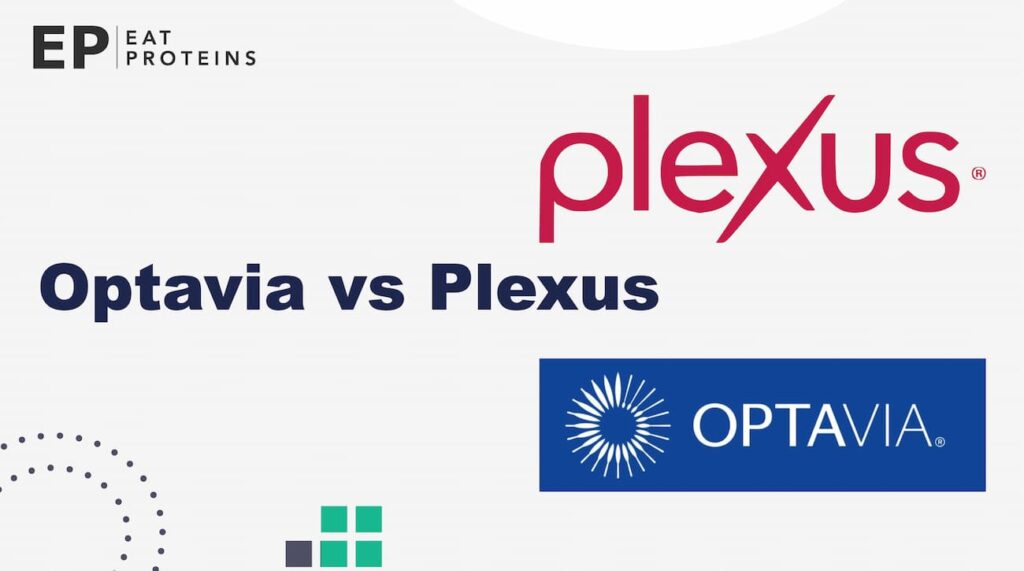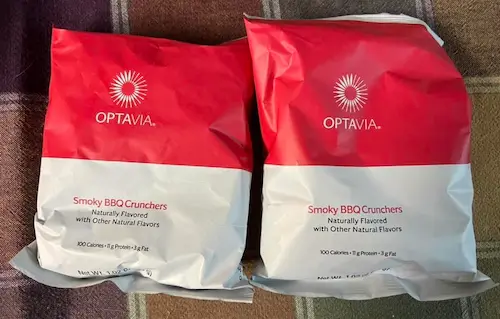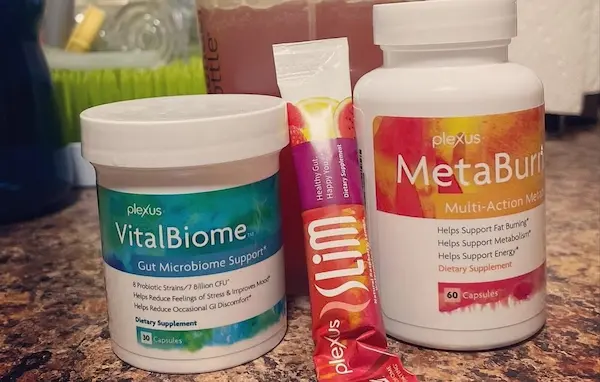
Optavia and Plexus are two leading health and wellness direct-selling companies, each offering unique weight loss programs. From my experience, Plexus Worldwide stands out with its wellness products and supplements, including the Plexus Slim Hunger Control drink mix, which aids in weight loss by helping reduce daily calorie intake.
On the other hand, Optavia provides meal replacements and weight loss products, complemented by coaching and an online community. Let’s take a look at Plexus and Optavia to help you figure out which one might be better for you and explore potential alternatives. They’re both about losing weight, but they do things a bit differently in terms of how they work, what they offer, and how they support you.
What is the Optavia?
Optavia is a weight loss program that combines low-calorie, reduced-carb eating with a mix of packaged foods and homemade meals, along with personalized coaching. It’s focused on not just losing weight but also on building healthier habits. In this diet, you eat a blend of Optavia’s processed foods called Optavia Fuelings and homecooked meals. I was eating five of these Essential Fuelings from Optavia each day, plus one meal that I prepared myself.
Optavia encourages healthy habits like managing your weight, eating well, staying hydrated, staying active, getting good sleep, creating a positive environment, and taking care of your mental health. One big perk of Optavia is that it’s super convenient and can help with weight loss. A study from 2022 by Christopher Coleman, funded by Medifast Inc. and published in the Current Developments in Nutrition, found that having a health coach from Optavia helps people stay on track and achieve their weight loss goals.
The Optavia diet works by eating five portion-controlled snacks every 2-3 hours, each with similar nutritional values. By following this plan, your body gets around 800-1,000 calories, putting it into a gentle but efficient fat-burning state. You’ll also learn how to make an Optavia “Lean and Green” meal, which usually includes lean protein and non-starchy vegetables. One-on-one coaching is a crucial part of the Optimal Weight 5 and 1 plan. Coaches are sales representatives who offer support and guidance to clients using their products. It’s worth noting that these coaches aren’t necessarily certified nutrition professionals, but many have been Optavia clients themselves.
What is Plexus?
Plexus Worldwide is a wellness company known for selling health products, especially those designed for weight loss. They offer powdered supplements that claim to help with weight loss, improve gut health, boost calorie burning, and support blood sugar levels. But, it’s important to note that the FDA didn’t approve these claims.
What’s more, a 2020 study led by Chandler Graf at Texas Tech University Health Sciences Center, as published in The Cureus Journal of Medical Science, told the story of a 30-year-old woman who developed a condition called Primary Immune Thrombocytopenic Purpura (ITP) after taking Plexus supplements. This disease results in a shortage of platelets in the blood, leading to bleeding and bruising.
The program starts with Plexus Slim Hunger Control, also known as the “pink drink.” It’s a drink mix you have twice a day, 30-60 minutes before meals, and it contains ingredients like green coffee bean extract. They claim it helps control appetite and promote gut health. The company also has Lean protein powder and other products for skin and gut health. To get the best results, they suggest using these products with a calorie-restricted diet and making healthy lifestyle changes like eating well and exercising.
Optavia or Plexus: Exploring Pros and Cons
Here’s a table for the pros and cons of the Optavia diet and Plexus.
| Optavia Diet | Plexus |
|---|---|
| Pros | Pros |
| Convenient and accessible | May aid in weight loss |
| No need to count carbs/calories | Complements lifestyle changes |
| Grab-and-go options | Positive reviews reported |
| Coaching and support available | |
| Cons | Cons |
| Hunger can be an issue | Lack of scientific evidence |
| Some Fueling ingredients may not be safe for everyone | Unknown ingredient amounts |
| Not effective for everyone |
Optavia vs Plexus: Breaking down the differences
Plexus and Optavia share some things in common, like their way of doing business and helping with weight loss or making it easier to eat healthily. To start, Optavia and Plexus are weight loss companies that use a network marketing approach. This means they have people, like brand ambassadors, who sell products directly to others, often through personal relationships and social networks. It’s a way for these brand ambassadors to earn money not just from sales, but also by bringing in and managing others who do the same.
In this structure, those at the top can make the most money, while those lower down may struggle. Plexus is open about its compensation plan, while Optavia doesn’t mention the MLM aspect on its website. However, they also have differences, such as the cost, what they offer, their meal plans, how much weight you might lose, what people say online, and more.
Cost
The cost of Plexus and Optavia can differ. Optavia’s well-liked plan, called Optimal Weight 5 and 1, which includes a guidebook and 154 servings of Fuelings, is priced at approximately $511.50 per month, not including taxes and shipping. On the other hand, Plexus prices depend on the package and your VIP status.
They have packages like Weight Loss Basics and Weight Loss Advanced with products such as Lean Whey, Slim Hunger Control, and BioCleanse. Non-VIP customers pay between $155.95 to $305.95 per month, while VIP customers get up to 25% off. Plexus allows you to buy directly at retail prices, but the VIP plan offers savings and exclusive offers to help you reach your health goals.
Products
Optavia and Plexus offer different products for weight loss. Optavia primarily sells meal replacement shakes and bars, each serving containing around 100-110 calories, fortified with 24 vitamins and minerals, 11 grams of protein, 14 grams of carbs, 3 grams of fat, and 6 grams of sugar. While they provide a good mix of nutrients, the serving size is just 32 grams, which might leave you feeling hungry. It’s worth noting that some of the ingredients in these Fuelings have been genetically modified, but they do not contain artificial sweeteners. Here’s the photo of one of the Optavia Fuelings – Smoky BBQ crunchers.

On the flip side, Plexus offers dietary supplements like Plexus MetaBurn, which contains ingredients such as Green tea extract, L-carnitine, Chromium, and Caffeine. You can take these supplements alongside your regular meals, and they work together to boost your metabolism, curb your appetite, and aid in fat loss.
Another option from Plexus is Plexus Block, a supplement that helps lower the glycemic index of food and reduce carbohydrate absorption. It contains glucomannan fiber, white kidney bean extract, chromium picolinate, and Bioperine. Both Plexus MetaBurn and Plexus Block come in convenient capsule form. Here’s the photo of Plexus MetaBurn, Plexus Slim, and Plexus VitalBiome.

Plexus Worldwide also sells other products for gut health, and skincare, and more recently launched the Plexus Pivotal 90-day program to help customers stay on track with their weight loss goals.
Weight loss results
The big difference in how Optavia and Plexus help you lose weight comes down to how their stuff works. With Optavia, it’s all about eating less – they give you smaller meals, and that leads to losing weight because you’re in a calorie deficit. On the other hand, Plexus doesn’t change your meal size, but it’s supposed to make you less hungry, so you naturally eat less and lose weight.
Optavia is known for its strict meal replacement 5 and 1 meal plan, and it’s supported by studies (funded by its parent company, Medifast Inc.) One 16-week study from 2018 published in Obesity Science & Practice found that people on the Optimal Weight 5&1 Plan lost an average of 5.7% of their body weight, and over a quarter of them lost more than 10%.
In contrast, there is limited research available to support the weight loss claims of Plexus. And while Plexus offers a range of weight loss supplements and products, there is no evidence to suggest that they are more effective than traditional weight loss strategies.
Customer reviews
From what I’ve seen in online reviews, Plexus tends to have a higher customer satisfaction rating compared to Optavia. Specifically, Plexus holds a customer review score of 3.51 out of 5, with only 57 complaints closed in the last 3 years. On the other hand, Optavia’s customer review score is lower at 1.55 out of 5, alongside 475 complaints closed in the same period.
It is also worth noting that Plexus has been accredited by the Better Business Bureau since December 2019, while Optavia is not accredited. Additionally, Optavia’s customer complaints seem to be more related to customer service, delivery, and refund policies. For instance, someone had a problem with their Optavia order in February 2023. They canceled it, but Optavia still charged them on the next Monday. They never got the products, asked for a refund, and haven’t got their money back yet. They tried calling Optavia’s customer service 10-12 times, but no one was helping them out.
On the flip side, Plexus has fewer complaints online at BBB, but the ones that pop up mostly revolve around their business practices, not so much around products. For instance, one person attended a Plexus event on gut health and hormones and wasn’t too happy. The Plexus reps pushed the customer to sign up for a monthly subscription and made some pretty bold claims about their products, like curing depression and shedding pounds, without any proof or studies to back it up.
Which one wins Plexus versus Optavia?
In my experience, Optavia is the better choice for those seeking convenient meal replacements without the hassle of cooking, though it does come at a higher cost compared to Plexus. On the other hand, if you prefer preparing your meals and just need a supplement to help control your appetite, Plexus might be the way to go. I’ve tried both and found that Optavia’s ease of use is great for a busy lifestyle, while Plexus offers more flexibility for those who enjoy cooking and meal planning. It’s important to remember, though, that Plexus and Optavia aren’t the only weight loss companies; there’s a wide array of other alternatives offering different approaches and solutions.
What other options are there instead of Plexus and Optavia?
There are many weight loss programs similar to Optavia and Plexus, such as Jenny Craig, Ideal Protein, or Nutrisystem when you want meal replacements all the way. If you prefer a mix of shakes and real food, SlimFast and Diet Direct are good choices. And if you’re into herbal supplements to curb your appetite, you might want to check out GOLO, Lipozene, Provitalize, or Happy Juice but remember to keep a balanced diet alongside them.
What’s the difference between Optavia, Plexus, and Happy Juice?
Optavia, Plexus, and Happy Juice have different ways of doing things. Optavia is into portion-controlled meals for weight management, while Plexus and Happy Juice are more about powdered drinks. Plexus leans more toward controlling hunger, while Happy Juice is all about boosting your mood, mental performance, and gut health by improving the connection between your gut and brain.
